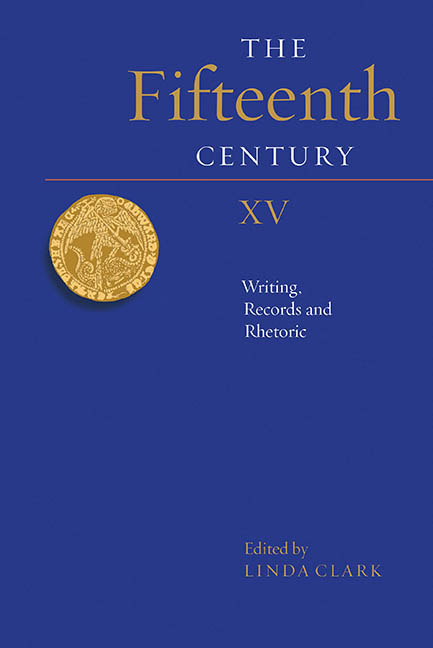Book contents
- Frontmatter
- Contents
- List of Illustrations
- Contributors
- Preface
- Abbreviations
- The Libelle of English Policy: The Matter of Ireland
- ‘Stories of Divers Regions and Provinces’: Some Digests of History and Geography for Late-Medieval English Readers
- ‘To please … Dame Cecely that in latyn hath litell intellect’: Books and the Duchess of York
- A Case Study in Lancastrian Service and Personal Survival: The Career of William, Lord Roos of Helmsley (c.1370–1414)
- Identity, Discourse and Political Strategy: Margrave Albrecht Achilles (1414–86) and the Rhetoric of Antagonism between Town and Nobility in Upper Germany
- The Redistribution of Forest Law and Administration in Fifteenth-Century England
- Well-Connected and Qualified Clerics? The Bishops of Dunkeld and Sodor in the Fifteenth Century
- Preaching Politics: Lancastrian Chancellors in Parliament
- Bishop John Alcock and the Roman Invasion of Parliament: Introducing Renaissance Civic Humanism to Tudor Parliamentary Proceedings
- Preaching on Magna Carta at the end of the fifteenth century: john alcock's sermon at paul's cross
- Index
- CONTENTS OF PREVIOUS VOLUMES
Well-Connected and Qualified Clerics? The Bishops of Dunkeld and Sodor in the Fifteenth Century
Published online by Cambridge University Press: 23 August 2019
- Frontmatter
- Contents
- List of Illustrations
- Contributors
- Preface
- Abbreviations
- The Libelle of English Policy: The Matter of Ireland
- ‘Stories of Divers Regions and Provinces’: Some Digests of History and Geography for Late-Medieval English Readers
- ‘To please … Dame Cecely that in latyn hath litell intellect’: Books and the Duchess of York
- A Case Study in Lancastrian Service and Personal Survival: The Career of William, Lord Roos of Helmsley (c.1370–1414)
- Identity, Discourse and Political Strategy: Margrave Albrecht Achilles (1414–86) and the Rhetoric of Antagonism between Town and Nobility in Upper Germany
- The Redistribution of Forest Law and Administration in Fifteenth-Century England
- Well-Connected and Qualified Clerics? The Bishops of Dunkeld and Sodor in the Fifteenth Century
- Preaching Politics: Lancastrian Chancellors in Parliament
- Bishop John Alcock and the Roman Invasion of Parliament: Introducing Renaissance Civic Humanism to Tudor Parliamentary Proceedings
- Preaching on Magna Carta at the end of the fifteenth century: john alcock's sermon at paul's cross
- Index
- CONTENTS OF PREVIOUS VOLUMES
Summary
Late medieval bishops were powerful men who were both spiritual leaders and secular lords. They had responsibility not only for all the ordinary people living within their territory or diocese, but also for the parish priests and monastic houses. The income which they and their dioceses might receive could be considerable, even in Scotland, which was poor compared with England. All these factors combined to ensure that the position of bishop was highly desirable. Consequently, a key question is what qualifications and experience did candidates who aspired to become bishops need? This paper focuses on two Scottish bishoprics: Dunkeld in central Scotland and Sodor (sometimes known as ‘The Isles’) on its western periphery. It examines the familial, social and educational backgrounds of the sixteen fifteenth-century bishops from these two dioceses, before then analysing the routes their careers took towards the episcopacy. What types of benefice did they hold? What evidence do we have for royal and lordly patronage? Finally, did considerations of age apply when it came to provision to a see?
The destruction of all the episcopal registers for the medieval Scottish dioceses creates challenges for historians attempting to study the identities and career-paths of clerics, including those who rose to be bishops. It is therefore necessary to begin with a discussion of what types of information we are missing from the registers and what sources might be used in their stead. In order to establish family and social identities, educational attainment and development of careers, we have to take a wide-ranging approach using sources such as papal registers, royal and lordly charters, parliamentary and university records and chronicles. I seek to demonstrate that through using this variety of sources it is possible to reconstruct the identities and careers of fifteenth-century bishops.
Examinations of the cohort of clerics who became bishops in fifteenth-century Scotland have principally been confined to studies of eminent individuals such as Bishops James Kennedy and William Turnbull. The exceptions are J.H. Burns's study of the Scottish clerics who participated in the deliberations of the Council of Basle between 1431 and 1449, and Isla Woodman's recent doctoral thesis on the education of Scottish bishops.
- Type
- Chapter
- Information
- The Fifteenth Century XV , pp. 109 - 124Publisher: Boydell & BrewerPrint publication year: 2017

